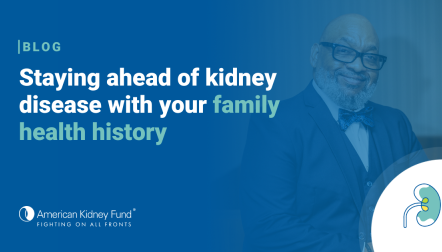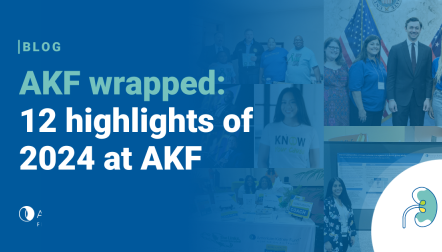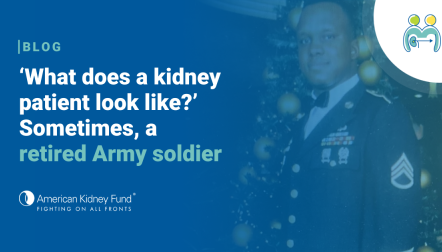
Blog post
'We go through a lot': Life with a rare kidney disease
According to the National Organization for Rare Diseases (NORD), a disease is considered "rare" if it affects fewer than 200,000 people in the United States. In the U.S., one out of every 10 people is living with a rare disease – which is about 30 million Americans.
Rare Disease Day, celebrated on the last day of February, is a day dedicated to spreading awareness of the millions of people worldwide living with a rare disease, as well as their families and caregivers. There are more than 10,000 known rare diseases and, of those, there are more than 150 types of rare kidney diseases.
According to NORD, approximately 70% of rare diseases begin in childhood – which was the case for Malkia White, Thelma Barber and Michelle Farley. However, only Malkia actually received her diagnosis of IgA nephropathy (IgAN) in childhood. She had no discomfort or symptoms, and the only indication that something was wrong was protein and blood in her urine detected through a routine test.

"All I remember [is that] I heard what the doctor said, 'You have Berger's disease and not much is known about it,'" said Malkia, who was diagnosed at the age of six when IgAN was called "Berger's disease."
IgAN is an autoimmune disorder, which is when your immune system does not function properly. The immune system is your body (cells and tissues) fight infection. IgAN causes your immune system to produce abnormal antibodies in your kidneys, which triggers inflammation and reduces the kidneys' ability to filter waste and fluid from the bloodstream. This causes damage to the kidneys and can eventually lead to kidney failure.
Despite her diagnosis, Malkia had a very active, full life. "From six years old to the age of 42, I maintained my medical appointments and lived an active lifestyle. I was an honor student. I was always in a dance class. In high school, I was in a marching band and on the field hockey team. In that time period, I was being checked," said Malkia. She also added that during those decades, "It never occurred to me, or my family, to investigate or research Berger's disease."

Thelma was also diagnosed with IgAN, but unfortunately, her diagnosis took much longer. Her symptoms began when she was 12 years old. "I suffered with swelling in my hands and feet, and I complained, and I used to tell my mom about it," explained Thelma. "And finally, when she had taken me, the doctor said that I needed to lose weight, that the weight was pushing down on my limbs, causing them to swell."
Like Malkia, Thelma was also an active youth, participating in track, marching band and color guard. "So, I was highly active and just to be told that I needed to lose weight, and pretty much dismiss my concerns and symptoms, it was very hurtful," said Thelma.
Unlike Malkia, Thelma did not have a urine test until 10 years later, identifying that the problem was in her kidneys. "I never would have imagined that it had something to do with my kidneys," said Thelma. And Thelma's doctor had a similar message as Malkia's: "The doctor at that time in 1993 [said] there was no information and nothing to do about it. It's rare," said Thelma. "They didn't know how you got it and what to do with it… Pretty much they said, just come back when the kidney goes, and you'll need dialysis or a kidney transplant."
Michelle had an even harder time getting diagnosed, as it turned out her disease was even rarer.

"I had a long history of unexplained and undiagnosed symptoms for many years that got progressively worse," Michelle explained. She had had abnormal bloodwork for years, with blood and protein in her urine since she was four years old. She consistently had high blood pressure and was diagnosed with irregular heartbeats in high school after having chest pains. At that time, she underwent a kidney ultrasound and bladder biopsy, but it did not result in any diagnosis.
In college, she suffered from daily vomiting and weekly headaches, and went to her college medical center with her blood pressure so high, she was in "a hypertensive crisis that could cause a stroke or heart attack." "They ran some bloodwork, and I had markers for kidney disease," said Michelle.
It wasn't until Michelle was 25 years old and in her first year of her PhD program that she finally received a diagnosis: an "ultra-rare" autoimmune disease called dense deposit disease, which is a type of C3 glomerulopathy (C3G).
Complement 3 glomerulopathy (C3G) is a type of kidney disease that causes a part of the immune system called the complement system to become overactive and not work properly, leading to damage and inflammation in the kidneys. Specifically, it damages the glomeruli, which help the kidneys filter toxins out of the blood. This damage prevents the kidneys from filtering toxins out of the blood and can cause kidney failure in about half of adults who are diagnosed with the disease.
"I was left undiagnosed for almost 22 years due to preconceived notions of how disabilities and sicknesses should 'look' on the outside and how old you need to be to have a chronic disease," said Michelle. "So, in a span of two months, I went from being told I was completely healthy to being told I would need a kidney transplant soon."

Many people living with rare diseases struggle to get an accurate diagnosis, and these delays, misdiagnoses and lack of intervention or treatment can cause kidney disease to turn into kidney failure, which requires dialysis or a kidney transplant to live. Which is ultimately what happened to all three women. Malkia received a deceased donor kidney, Michelle received a living donor kidney and Thelma has had two transplants, one of each.
Living with a chronic illness like kidney disease is not only physically challenging, it is also mentally challenging. These can be even more difficult when living with a rare disease.

"It takes a toll on your mental health because you feel captive because there's nothing that you can do really to change the outcome of the situation because it is rare and there's no research on it," said Thelma. "I find that I put mental strain on myself because every month I'm going to the doctor to get my labs tested because I never want more than 30 days to go by to realize that this disease has popped up again."
"Every day has been impacted by my kidney disease, even before diagnosis," said Michelle. "Only people with chronic illnesses and disabilities can understand how much energy simple tasks need. Even holding a conversation can be tiring, as you are acutely aware of the effort and energy-expense in just making and holding facial expressions."
After waiting so long for a kidney, Malkia, "got severely depressed," ended up resigning from her job (in which she had been newly promoted) and moving back to St. Louis. She also recalled, "I did not look like what I was going through. If you see pictures of me from 2017 through 2021 in stage 5 renal failure, I look like the picture of health. And I believe the public sees a person who looks like the picture of health and probably says, 'She looks good, I don't need to donate a kidney to her.' There is no look to this disease. Not all the time. That's what I would convey to somebody."

"I think it is important for people to advocate for themselves within the medical field," said Michelle. "Rare diseases are often overlooked and take longer to get a diagnosis. I think it is important to remember that you know your body better than anyone, and if you think something is wrong, you are probably correct. I had to become a specialist in my own disease so I could question and argue effectively with doctors throughout the years. I have worked hard to surround myself, in life and within my care team, with people I trust and who will advocate for me."
Thelma agreed that it was important for people with rare diseases to take an active role in their care management. "It's important to partner with your doctors. Although I had a bad experience, I didn't let that experience define what I actually believe to be important throughout my care, and that is partnering with my doctor. For us to go through this process together, so that I can learn and so that I can express concerns about the way things are going with my health."
"Some diseases are preventable," said Malkia. And even if the disease is not, the progression of kidney disease can be slowed down. "Dialysis and transplants are preventable, and the public just needs to know how to take good care of their kidney health."

All three women are eager to spread awareness of rare diseases like theirs. That is why they all joined the American Kidney Fund's Rare Kidney Disease Action Network (RKDAN). Launched in 2024, RKDAN was created to advocate on behalf of the rare kidney disease community. Members connect with each other to learn about policy issues impacting kidney care, receive training on how to educate lawmakers and the public about kidney disease and share their kidney journeys.
"I think it is important to spread awareness about rare diseases and specifically, rare kidney diseases so patients can be diagnosed faster and more accurately," said Michelle. "I always wonder how long I could have maintained my native kidneys if I was diagnosed as a child when the symptoms and abnormal results first started."
"I really feel that living with a rare disease, or just any disease, is very overwhelming, and I think that providers really need to look at treating patients from the holistic point of view," said Thelma. "Because we go through a lot. We have to deal with mental [concerns], there's financial [concerns] – I just think that it's important for everybody to know that you have to take care of your complete self, mind, body, spirit and soul."
AKF is committed to improving our understanding of rare diseases, from providing educational resources to continuing leading efforts like RKDAN.
Find out more about rare kidney diseases, other kidney problems or find out how you can participate in Rare Diseases Day.
RKDAN is supported by Novartis Pharmaceuticals Corporation, Otsuka America Pharmaceutical, Inc. and Travere Therapeutics.





